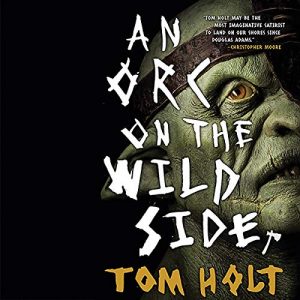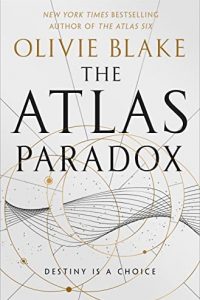Amy Goldschlager Reviews Audiobooks: An Orc on the Wild Side by Tom Holt and Sixteen Ways to Defend a Walled City by K.J. Parker
 An Orc on the Wild Side, Tom Holt; Ray Sawyer, narrator (Hachette Audio 978-1-47898841-0, $24.98, digital download, 14 hr., unabridged) September 2019.
An Orc on the Wild Side, Tom Holt; Ray Sawyer, narrator (Hachette Audio 978-1-47898841-0, $24.98, digital download, 14 hr., unabridged) September 2019.
Sixteen Ways to Defend a Walled City, K.J. Parker; Ray Sawyer, narrator (Hachette Audio 978-1-54915698-4, $24.98, digital download, 13.25 hr., unabridged) December 2019.
In the late 1980s, I fell in love with Tom Holt’s first novel, Expecting Someone Taller, an amusing work that took the characters from the Nibelungenlied into the 20th century. But subsequent comic efforts, including Who’s Afraid of Beowulf, Flying Dutch, and Ye Gods! felt like weaker, much-of-a-muchness works, and I dropped him as an author.
About 20 years later, I adored K.J. Parker’s brilliantly constructed dark fantasy, Devices and Desires, and always meant to read more of his work, but somehow never got around to it. You could have knocked me over with a feather when the news broke a few years ago that K.J. Parker was a pen name for Tom Holt. When I learned that both authorial personas had recently published books, and that Hachette uses the same narrator for each, it seemed the perfect opportunity to revisit, as well as compare and contrast, the two. In the end, I discovered that they weren’t as different as I had previously thought.
An Orc on the Wild Side is the fifth in the YouSpace series; although I hadn’t read or listened to the previous four, it wasn’t difficult to get the gist. After a scientist developed a way to travel to different universes via a doughnut, various unscrupulous types began exploiting the invention for serious profit. In this installment, a British wheeler-dealer has convinced a number of wealthy couples to retire to what is essentially Middle-earth with the serial numbers not so much filed off as barely obscured, selling the rich and gullible a variety of dubious properties that include a dark sorcerer’s tower, a sinister mine, and a strangely familiar hobbit hole. These new residents, who aren’t entirely clear on where they’ve landed – other than that it’s more unspoiled than rural France and is grievously devoid of plumbers – bring with them a variety of cheap consumer goods that catch the attention of the dwarf king, as well as his cook, an opportunistic young Englishwoman who plans to flood the market with them, regardless of how it affects the local economy. Meanwhile, the recently crowned Dark Lord, the goblin King Mordak, decides to introduce a female goblin into his previously all-male race, only to discover that doing so potentially fulfills a prophecy predicting the return of his predecessor, the red-eyed Nameless One.
The first-person chronicler of Sixteen Ways to Defend a Walled City is Orhan, a pale-skinned former slave who will never be entirely welcomed by the blue-skinned citizens of Robur, even if he has risen to the position of Colonel-in-Chief of the Engineers. But when a surprisingly organized force of pirates and raiders slaughter most of the Imperial army, wreck the navy, and either steal or destroy most of the empire’s military supplies, Orhan somehow ends up commanding the defense of the imperial capital against a besieging army who only awaits their leader to attack. Using a purloined (and then a forged) imperial seal, his engineering genius, a thorough knowledge of history, an uneasy alliance between the two major crime factions, and his wits, this upjumped con artist attempts to mount a defense against overwhelming odds. An already impossible task gets more complicated when Orhan discovers an unexpected connection to the invaders, and he must decide what side he’s really on.
The contrast in tone between these two books is a classic one in British comedy, which I like to think of as the Mr. Bean vs. Blackadder difference: a broadly comic, pratfall-filled commentary on society vs. a darkly humorous, insult-filled, cynical, and generally more intellectual commentary on society. Narrator Ray Sawyer takes his cues accordingly from each book. There’s a sort of bland, matter-of-fact narration that can set the absurdity of a story into sharp relief, and Sawyer absolutely has that down for An Orc on the Wild Side. But he also seems to feel that exaggerated, silly-sounding women’s voices are also amusing, and I am not quite sure I agree, especially since they don’t match the direction of the text. Holt describes the female goblin’s voice as deep and growly, but Sawyer makes her high-pitched and petulant instead. And, for some reason, the wraith who became undead as a young woman sounds more like a querulous old woman. He’s trying just a bit too hard to seem funny, and it falls flat.
Sawyer seems a lot more relaxed when narrating Sixteen Ways to Defend a Walled City. He beautifully inhabits the sardonic but secretly good-hearted Orhan, and has a lovely booming voice for Orgus, the leader of the invaders. There are fewer female characters in this one, but their voices are much more natural-sounding.
Both novels offer a critique on colonialism and prejudice. The Parker novel has a more complex take on the issue through Orhan’s struggle with divided loyalties and his desperate efforts to save a city whose citizens will never consider him one of them. I thought that Holt/Parker had some compelling and plausible things to say on these subjects, but some people might wonder if a white British man benefiting from the fruits of centuries of a colonial empire is truly best placed to make those arguments, and whether exploring the topic by portraying a white man as the victim of prejudice is ironic or tone deaf. I’m also not exactly sure whether his depiction of the female goblin in An Orc on the Wild Side is misogynistic, an attempt at feminism, or both. She’s portrayed as bigger, stronger, and more intelligent than the male goblins; at the same time, she has an apparently instinctive obsession with her appearance that pops up almost immediately after she’s spawned. Surely it’s intended as a joke, but it just comes off as clunky and crude.
At the end of this journey, my opinions about Holt and Parker really have not changed. There is a certain cleverness and charm, but also some hokey missteps, in Holt’s work; I prefer Parker’s darker, dryer delights, and intend to sample them again in future.
This review and more like it in the April 2020 issue of Locus.
 While you are here, please take a moment to support Locus with a one-time or recurring donation. We rely on reader donations to keep the magazine and site going, and would like to keep the site paywall free, but WE NEED YOUR FINANCIAL SUPPORT to continue quality coverage of the science fiction and fantasy field.
While you are here, please take a moment to support Locus with a one-time or recurring donation. We rely on reader donations to keep the magazine and site going, and would like to keep the site paywall free, but WE NEED YOUR FINANCIAL SUPPORT to continue quality coverage of the science fiction and fantasy field.





